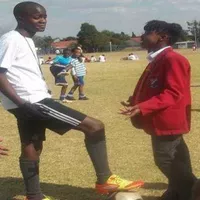آندیسوا سِتارِه یِ فوتبال
Andrés|Stern||
Andeswa|Star||football
Andiswa|gwiazda||piłka nożna
Andisova ist ein Fußballstar
Η Αντίσοβα είναι σταρ του ποδοσφαίρου
Andisova is a football star
Andisova es una estrella del fútbol
Andisova est une star du football
Andisova è una stella del calcio
Andisova is een voetbalster
Andisova jest gwiazdą futbolu
Andisova é uma estrela do futebol
Andisova bir futbol yıldızıdır.
Андісова – зірка футболу
安迪索瓦是一位足球明星
آندیسوا چَند پِسَر را دَر حالِ فوتبال بازی تماشا کَرد.
||Junge|||||||
Andisva|a few|boys||||football|game|watched|watched
||chłopak||||||oglądać|
Andiswa watched some boys playing football.
Andiswa a regardé des garçons jouer au football.
Andiswa obserwował kilku chłopców grających w piłkę nożną.
او آرِزو داشت کِه بِتَوانَد آنها را هَمراهی کُنَد.
||||kann|||begleiten|
|wish|||could|||accompany|
|życie|||mógł|||towarzyszyć|
Er wünschte sich, sie begleiten zu können.
He wished to be able to accompany them.
Il souhaitait pouvoir les accompagner.
Marzył o tym, żeby móc do nich dołączyć.
او اَز مُرَبی پُرسید که آیا میتَوانَد با آنها تَمرین کُنَد.
|||fragte|||||||Übung|
||the coach|asked||||can|||exercise|
||trener|||||może|||ćwiczenie|
Er fragte den Trainer, ob er mit ihnen trainieren könne.
He asked the coach if he could train with them.
Il a demandé à l'entraîneur s'il pouvait s'entraîner avec eux.
Zapytał trenera, czy może z nimi ćwiczyć.
مُرَبی دَستانَش را رویِ کَمَرَش گُذاشت.
|||auf|Hüfte|
The coach|his hands|his/her/their|on|his waist|put
|ręce|||biodrze|
Der Trainer legte die Hände auf seine Hüften.
Morabi put his hands on his waist.
Morabi posa ses mains sur sa taille.
Trener położył ręce na biodrach.
و گُفت: “دَر این مَدرِسه، فَقَط پِسَرها اِجازِه یِ فوتبال بازی دارند.
|sagte||||||||||
||||school|only|boys|permission||football|play|they have
|||||||zezwolenie||||
And he said: "In this school, only boys are allowed to play football.
Et il a dit : "Dans cette école, seuls les garçons sont autorisés à jouer au football.
I powiedział: "W tej szkole tylko chłopcy mają pozwolenie na grę w piłkę nożną."
”
"
"
پِسَرها به او گُفتَند بُرو بَسکِتبال بازی کُن.
|||||Basketball||
the boys|||said|go|basketball|play|
|||||koszykówka||
The boys told him to go play basketball.
Les garçons lui ont dit d'aller jouer au basket.
Chłopcy powiedzieli mu, żeby poszedł grać w koszykówkę.
آنها گُفتَند بَسکِتبال بَرایِ دُختَرهاست وَ فوتبال بَرایِ پِسَرها.
||basketball|for|it's for girls||||boys
||||dziewczynki||||
They said basketball is for girls and football is for boys.
Ils disaient que le basket était pour les filles et que le football était pour les garçons.
Oni powiedzieli, że koszykówka jest dla dziewczyn, a piłka nożna dla chłopaków.
آندیسوا اَندوهگین شُد.
|traurig|
Andisva|sad|
|smutny|
Andiswa became sad.
Andiswa était attristé.
Andisua była smutna.
روزِ بَعد، آن مَدرِسه یِک مُسابِقِه یِ فوتبالِ بُزُرگ داشت.
|||||Wettbewerb||||
|next||school||competition||football|big|had
dzień|||||zawody||piłka nożna||
The next day, that school had a big football competition.
Le lendemain, cette école a organisé un grand match de football.
Dzień później, ta szkoła miała dużą rywalizację w piłkę nożną.
مُرَبی نِگَران بود چون بِهتَرین بازیکُنَش مَریض بود وَ نِمیتوانست بازی کُنَد.
|besorgt||||Spieler|||||||
coach|worried||because|best|his player|sick||||could|game|
|zmartwiony|||najlepszy|jego zawodnik|chory||||mógł||
L'entraîneur était inquiet car son meilleur joueur était malade et ne pouvait pas jouer.
Trener był zaniepokojony, ponieważ jego najlepszy zawodnik był chory i nie mógł grać.
آندیسوا بِه سَمتِ مُرَبی دَوید و اِلتِماس کَرد کِه بِه او اِجازِه یِ بازی بِدَهَد.
||||||bitte||||||||
Andiswa||towards|coach|David||plea|||||permission||play|give
||||||prosić||||||||dać
Andisova ran to the coach and begged to allow him to play.
Andisova a couru vers l'entraîneur et l'a supplié de lui permettre de jouer.
Andisva pobiegł do trenera i błagał, aby dał mu pozwolenie na grę.
مُرَبی مُطمئِن نَبود که چِه کاری اَنجام بِدَهَد.
the coach|sure|was||what to do|action|perform|should do
|pewien|nie było|||||
Morabi was not sure what to do.
Morabi ne savait pas quoi faire.
Trener nie był pewien, co powinien zrobić.
سِپَس تَصمیم گِرِفت که آندیسوا میتَوانَد تیم را هَمراهی کُنَد.
then|decision|he decided||Andiswa||can|the team||accompany|
|||||||drużynę|||
Then it was decided that Andisova can accompany the team.
Ensuite, il a été décidé qu'Andisova pouvait accompagner l'équipe.
Następnie zdecydował, że Andisva może dołączyć do drużyny.
بازی سَختی بود.
game|tough|was
|trudność|
It was a tough game.
C'était un match difficile.
Mecz był trudny.
هیچکَس تا نیمه یِ بازی گُل نَزَده بود.
||der Halbzeit|||Tor|geschossen|
No one||halfway through|of the|game|goal|scored|
||połowy||||strzelił|
Nobody had scored until the half of the game.
Personne n'avait marqué jusqu'à la mi-temps.
Nikt nie strzelił gola do połowy meczu.
دَر جَریانِ نیمه یِ دُوُمِ بازی یِکی اَز پِسَرها توپ را به آندیسوا پاس داد.
|verlaufenden|zweiten Halbzeit|||||||Ball|||||
|during|the second half||second||one||the boys|ball|||Andiswa|pass|
|przebiegu|||drugiej|||||piłka||||podanie|
During the second half of the game, one of the boys passed the ball to Andiswa.
Au cours de la seconde moitié du match, l'un des garçons a passé le ballon à Andiswa.
W trakcie drugiej połowy meczu jeden z chłopaków podał piłkę Andisowi.
آندیسوا با سُرعَتِ خِیلی زیاد بِه سَمت دَروازِه حَرِکَت کَرد.
||mit sehr hoher Geschwindigkeit|||||Tür|bewegte sich|
Andeswa||speed||very||towards|door|movement|
||prędkości||||kierunku|drzwi|ruch|
Andisova moved towards the door very fast.
Andisova se dirigea vers la porte très rapidement.
Andis z wielką prędkością ruszył w stronę bramki.
او مُحکَم بهِ توپ ضَربِه زَد وَ گُل زَد.
|kräftig|||Schuss||||
|strongly||ball|strike|hit||goal|scored
He hit the ball firmly and scored a goal.
Il a frappé la balle fermement et a marqué un but.
Mocno uderzył w piłkę i zdobył gola.
تَماشاچیان بِسیار هیجان زَده شُدَند.
die Zuschauer|||aufgeregt|
the spectators|very|excited|excited|
widzowie|bardzo||zły|
The audience was very excited.
Le public était très excité.
Widzowie bardzo się podekscytowali.
اَز آن زَمان بِه بَعد، دُختَرها هَم اِجازه یِ فوتبال بازی دَر مَدرِسه را پِیدا کَردَند.
|||||||||||||||haben gespielt
||time|from then on|from then on|girls|also|permission||football|play||school|the ability to|gained|obtained
||czasu|||dziewczynki||zgoda||||||||
From that time on, girls were also allowed to play football in the school.
À partir de ce moment-là, les filles ont également été autorisées à jouer au football à l'école.
Od tego czasu dziewczęta również uzyskały pozwolenie na grę w piłkę nożną w szkole.

